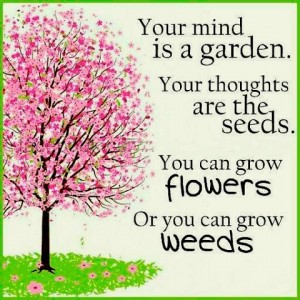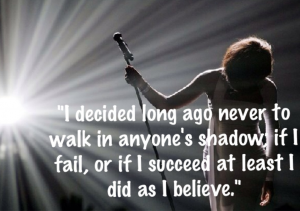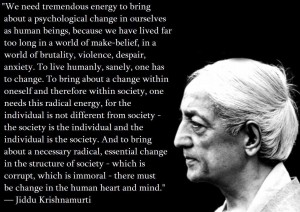[管理自己]
☆ Control yourself (Marcus Tullius Cicero)
If I knew myself I would run away.
( Johann Wolfgang von Goethe )
由於沒有人是完美的,每個人除了美好的一面之外,
或多或少都有不美好的一面,
然而良知尚存的人會知道自己的缺點,
知道自己的惡行,並且會因此而感覺到羞恥。
良知尚存的人有能力通過內心的掙扎,作出抉擇,
抗拒誘惑,放棄惡行,甚至阻止別人的惡行。
所謂修行,就是燃起自己的良知,擇善固執,
控制自己的缺點,不讓這些缺點來控制自己。
這個說法,頗有儒家「克己復禮為仁」的意味,
也好像儒家所鼓吹的君子「慎獨」的功夫。
it is with our own luxury, our own folly,
our own criminality that we have to contend.
( Marcus Tullius Cicero )
All the gods, all the heavens, all the hells,
are within you.
( Joseph Campbell )
The truth is you don’t need to be given a
solution. You just need to learn eventually
that you are the solution.
( Mobeen Hakeem )
What lies behind us and what lies before us
are tiny matters compared to what lies within us.
( Ralph Waldo Emerson )
善良的道可以成為肉身,住在我們中間,
邪惡的道同樣也可以成為肉身,住在我們中間。
換言之,人就是善良和邪惡的「介質/肉身/戰場」,
人生的修行就是選擇簡單神聖的善良,追求智慧,
抗拒精心設計、複雜難覺和擁抱虛偽的邪惡。
畢竟為善抑或為惡,是每一個人自己的抉擇!
Life is neither good or evil,
but only a place for good and evil.
( Marcus Aurelius )
The soul becomes dyed with the color of its thoughts.
( Marcus Aurelius )
要管理好自己,就需要面對和處理生命中遇上的一切恐懼,
包括對暴力的恐懼,對真理的恐懼,和對死亡的恐懼,
而方法只有一種,就是追求並且努力增添個人的智慧。
Do I prefer to grow up and relate to life directly,
or do I choose to live and die in fear?
( Pema Chodron )
Fear is a natural reaction to
moving closer to the truth.
( Pema Chodron )
正如 Osho 指出,
「心 mind」既可以成為一個美麗的僕人 a beautiful servant,
也可以成為一個危險的主人 a dangerous master。
歷史上權力所帶來的腐化,
及資本主義社會鼓勵人性中的自私、貪婪、妒忌、憎恨,
一向在人類的心中佔盡上風!
中國俗語說「有錢能使鬼推磨」,
及毛澤東的名句「槍桿子裡出政權」,
都指出金錢的對一般人心和權力對梟雄的吸引力。
「唯利是圖,金錢萬歲」這個信念所產生的種種現象,
足以證明人類的心是可以如何地醜陋!
即使我們拒絕做醜陋的事情,
然而一旦物質慾望佔了上風,遠超過我們的需要,
不但會大幅度降低我們的自由,亦會浪費我們的生命!
「人情若厭其所有,羡其所不可得,
未得則羡,已得則厭,厭而求新,
則為惡無不至矣。」 (北宋。司馬光)
共產黨執政時代鼓吹的文化大革命,
不但證明了人性中的自私、憎恨、醜惡和虛偽,
更加證明了人間地獄絕對可以由人類創造出來。
參考:《人性理論》(上)
Osho 的提點,對那些頭腦不清,糊裡糊塗就大張旗鼓,
盲目地鼓吹「接受自己」和「我係我」的人,無疑是當頭棒喝。
即使我們假設「接受自己」和「我係我」這兩個說法是對的,
但亦必須先考慮道德問題,但如果我們不願意管理自己,
那麼「接受自己」和「我係我」算是「我 I」的自由嗎?。
Your soul (mind) is oftentimes a battleground,
upon which your reason and judgment wage war
against your passion and your appetite.
( Khalil Gibran )
I thoroughly disapprove of duels.
If a man should challenge me, I would take
him kindly and forgivingly by the hand and
lead him to a quiet place and kill him.
( Mark Twain )
What other dungeon is so dark
as one’s own heart!
What jailer so inexorable as one’s self!
( Nathaniel Hawthorne )
The truth may be out there,
but lies are inside your head.
( Terry Pratchett )
Either you control your attitudes and thoughts
in you mind or your mind will control you.
When you believe every toxic thought that
runs through your mind, and when you
insist on building your sense of self and
your entire life based on those thoughts,
your mind becomes a dangerous master.
( Jason Ling )
從宗教的角度來看,
人心中的「我 ego」一向是邪惡最喜歡棲息的地方,
只有人心中的「心靈 soul」才是一切宗教精神的發源地。
修行的第一步,就是回歸心靈,開放心靈,追求智慧,
讓心靈主持人生大局,趕走「我 ego」裡的虛偽和邪惡。
換言之,所謂管理自己就是「改邪歸正」,克服邪,回歸正!
所以聖經《箴言4:23》裡說:
「你要保守你心,勝過保守一切,
因為一生的果效是由心發出。」
意思就是要基督徒慎防心中的「我 ego」被魔鬼所佔領。
而所謂「打開你的心,接受神作為主宰」,
意思就是讓「愛和智慧」在心靈之中成長,主持大局。
換言之,就是讓「心靈 soul」來領導「我 I」,
而不是任由「我 ego」之中的邪惡來控制「我 I」!
We should become angels and not devils,
that’s why we have been created and born
into the world. Therefore be and stick to
what God has chosen you for.
( Paracelsus )
「勝人者有力,自勝者強。」
《老子。道德經。第三十三章》
My liveliest delight was in
having conquered myself.
( Jean-Jacques Rousseau )
One must think like a hero to behave
like a merely decent human being.
( May Sarton )
We only get one body. We can either
treat it as the home of our ego or
as a temple of our soul.
We only get one life.
It can be shaped by our ego.
It can also be shaped by our soul.
We will become what we choose.
( Jason Ling )
上善若淨水,上惡若污水。
人一旦選擇上惡,就願意埋沒良知,放棄人格,
閹割心靈,活在污水之中。
無論是上善還是上惡,他們的座右銘都是
「知之者不如好之者,好之者不如樂之者」,
做善事的人感覺快樂,做惡事的人何嘗不感覺快樂?
我們要想一想:「做事感覺快樂」是最重要的嗎?
修行,就是將未夠潔淨的水過濾,將之回復潔淨,
嚴防一滴污水將整缸水變臭。
Evil appears in the absence of the soul.
Beware of your mind because it is the
center of your lifelong battlefield.
Your task is to revive your soul and
find all the subconscious forces within
that control your mind.
To grow, self-confrontation is inevitable.
Extol the angels in your soul and
subdue the devils in your ego.
Let your ego perform only those
necessary and unharmful social functions.
Humble yourself, learn from the wise,
both from the past and at present,
to avoid humiliating yourself
with hypocrisy or arrogance.
( Jason Ling )
人的腐化,源自讓「我 ego」主持大局。
人一旦讓「我 ego」主持大局,
就會被「欲望」desire 和「恐懼」fear 所操縱,
出現心理學所說的 self-alienation 的現象,即是
estrangement from our souls [true selves] 。
最常見的欲望有三類,分別和「名、利、權」有關:
為了權力而墮落,為了金錢而墮落,
因為過度喜歡名氣或者別人尊敬和奉承而墮落。
人一旦選擇墮落,就會擁抱虛偽,思考力就會減弱,
智慧就會褪色,甚至胡說八道,醜態百出,
而且傾向於和同樣墮落的人埋堆!
最常見的恐懼有兩類,亦和「名、利、權」有關:
恐懼死亡,其實只是部份和關心身體健康有關,
主要是因為恐怕失去了一切屬世的擁有物;
恐懼失去了別人的尊敬和奉承,包括家人在內。
There is only one kind of love,
but there are a thousand imitations.
( Francois de La Rochefoucauld )
「去山中之賊易,去心中之賊難。」 (明。王守仁)
「認識自己」是否人類心靈救贖的第一步?
「自我批判」是否人類心靈救贖的第二步?
「知錯能改」是否人類心靈救贖的第三步?
「自我教育」是否人類心靈救贖的第四步?
「認識別人」是否人類心靈救贖的第五步?
「管理自己」是否就是人類精神健康的定義?
「知己知彼」是否就是關乎在社會中「生存」,
及進一步的「生活」所必須的人際關係學問?
「虛偽」是雅俗共賞的普世價值,但我應該選擇追隨群眾嗎?
我真的討厭恭維、擦鞋、阿諛、奉承,和別人的拍馬屁嗎?
還是只是討厭別人拍馬屁的方式及言不由衷的內容?
恭維、擦鞋、阿諛、奉承、拍馬屁的內容是否需要接近真相?
如果內容遠離真相,那麼會否成為自己將來的一個陷阱?
It is a self-flattering contradiction,
that wise men despise the opinion of fools,
and yet are proud of having their esteem.
( Marquess of Halifax )
要想控制自己的缺點,
方法不外乎「信仰、理性和愛」三大法寶,
但需要勇氣才能夠執行。
至於信念和迷信,在短期內也許有效,
可惜一旦遇上複雜的課題時就立即不管用。
舉例言之,中國古代的「性善說」就是屬於迷信;
儒家的「人性向善說」則是一個假說,可以視之為信念,
而儒家的追隨者亦明白這個道理,
所以儒家有「知其不可而為之」的說法;
至於「部份人的人性向善」則可以視之為信仰。
Love, wisdom and courage are flowers
that do not grow in everyone’s garden.
令人莞爾的是,
有一些人的心中只有雜草,根本就沒有花朵。
When we go to their gardens,
we cannot find a single flower.
然而他們會視這兩句說話為座右銘:
Don’t invite people to your garden
who trample on your flowers.
I want more out of my life.
因為這兩句內容曖昧的說話,對庸才同樣適合!
如果一個人立志「做學問」,
那麼在控制自己的缺點方面,有四個最重要的概念不可不知:
1. 一定要對真理謙卑,而不是對人假謙虛。
2. 必須勇於「自我批判」和「內省」self-scrutiny,
因為自我就是「做學問」最重要的工具。
換言之, the soul and the devil’s advocate
is actually the same person.
3. 凡是願意批判我們的人就是朋友。
4. 批評我們的人,雖然不一定是朋友,
但必須從他們的身上學習,讓他們成為自己認識社會的途徑。
「人能暴吾過者,吾師也;人能非吾言者,教吾者也;
切不可當面錯過,反生嗔怒。」 (南宋。朱熹)
Every challenge, difficulty, criticism or defeat
contains within it the seed of an equivalent
or greater good.
( ancient wisdom )
西方人十分喜歡說一句曖昧的說話:
Those who are truly important in your life
are the ones who bring out the best in you.
為甚麼筆者認為這句說話曖昧?
試問多少人會視一位願意花時間批判你的人為朋友?
會認為他是你生命中一位重要的人物?
閣下會視一位喜歡拍你馬屁、隱藏你的醜陋的人為朋友嗎?
會認為他是你生命中一位重要的人物嗎?
如果閣下不懂得看自己的紫微斗數命盤的話,
閣下又是否知道甚麼是自己最好的一面?
會在「我 ego」裡面嗎?會在「心靈 soul」裡面嗎?
是否只有自己才能夠自我批判、自我教育?
☆ Make the most of yourself.
我們常常聽見有人說:那些年為了生存,忘記生活。
不但讓「我 ego」主持大局, 甚至出賣心靈的理想,
把自己的未來建立在別人期望之上!
管理自己的另一種做法,就是盡其在我,努力發展自己的長處。
Be yourself 是不適當地簡略的說法,
Be yourself 真正的意思應該是
Be your best self,
be guided by your better natures.
能夠在青年時期就回歸心靈的人,是有福氣的人。
因為不論在何種逆境之下,他們都會堅守自己的人格,
視逆境為心靈的鍛煉,培育一顆更堅強更有智慧的心靈。
Make the most of yourself,
for that is all there is of you.
( Ralph Waldo Emerson )
Life consists not in holding good cards
but in playing those you hold well.
( Josh Billings / Henry Wheeler Shaw )
一旦我們讓「心靈 soul」來領導,主持人生大局,
就會聆聽優秀的音樂來管理自己的情緒和工作壓力。
The soul is a beautiful but hidden sculpture.
Most of the ego is the unwanted stone
before the sculpture is completed.
You must learn to be your own sculptor.
( Jason Ling )
能夠做到以上三點的,就達到了 self-mastery 的境界,
就是西方人所說的「擁有自己的生命」own your life,
也是西方人曖昧地說自愛 love yourself 的真正意思。
能夠達到 self-mastery 的境界,就可以
Enjoy who you are and accept what life offers
with gratitude and contentment.
只有從這個境界來看,下面這句歌詞才有積極的意義:
從管理自己的角度來看,
下面這句說話未免定義曖昧不清,流於故作高深:
He who lives in harmony with himself
lives in harmony with the universe.
( Marcus Aurelius )


